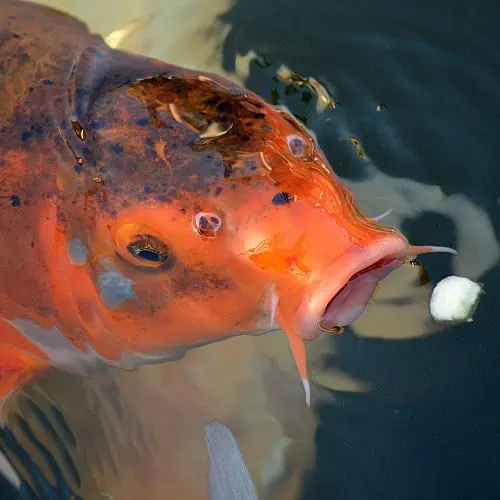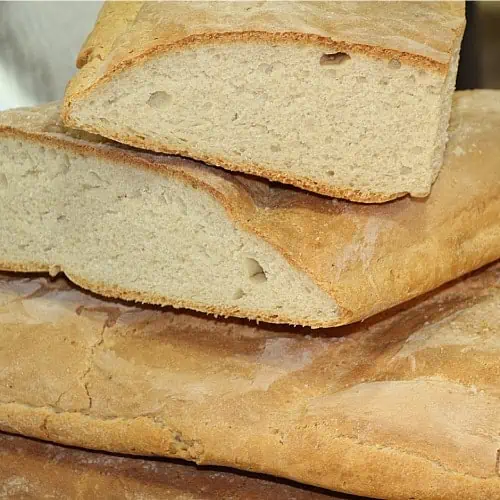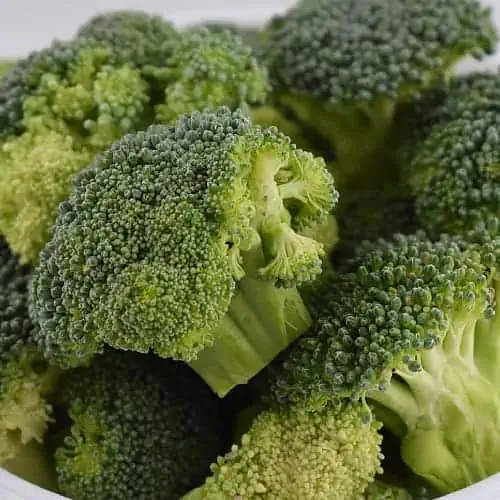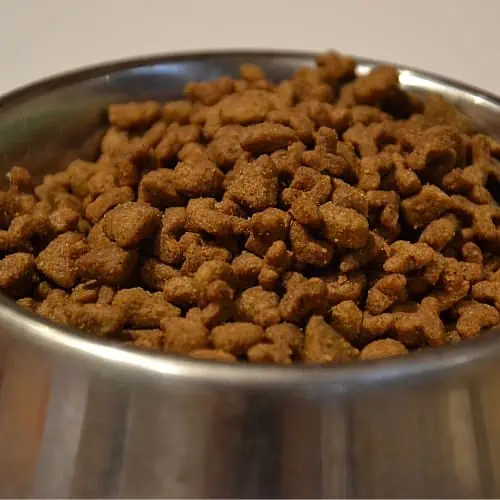
Koi are often adventurous eaters with diverse appetites, and really enjoy trying new foods beyond their traditional pellet feeds. However, they also have particular dietary requirements and making sure that these needs are met is a must to ensure their health and happiness. Koi need diets that are high protein, about 35 to 40%, and can be supplemented with fruits, veggies, and the (very occasional) grain to help them reach their vitamin and mineral demands.
In addition, lipids (or fats) should make up 5 to 10% of their diet, with this number increasing to closer to 15% in the fall and winter if you live in a cool area, and less than 10% carbohydrates as having too starchy of a diet can lead to liver degeneration in koi. Vitamins B, C, A, D, and K as well as the minerals iron, copper, and magnesium must be obtained via food, while some other minerals can be absorbed into their bodies from the water.
In addition to making sure that their nutrition needs are met, what you feed your koi must also be, of course, safe to consume. These foods should also be regarded more so as supplementing the koi’s diet, adding to their normal koi feed rather than replacing it to ensure that they maintain a varied and nutrient rich diet. Koi have been known to eat just about anything that’s given to them, but that’s doesn’t always mean that they should. Here we will cover some of the most commonly asked about foods and whether or not they’re considered good or bad for your koi. If you’d like to read our guide on what wild carp eat, you can find it here: What Do Koi Carp Eat in the Wild? (Surprising Facts)
Can Koi Eat Bread, Cereals & Cooked Rice?

In short, yes, koi can eat bread, cereals and cooked rice. They’ll happily gobble these items up, but the issue is that, as mentioned above, koi can’t have too many carbohydrates or they risk developing various health issues. Starchy foods like these should only be fed in moderation to your koi (remember, carbs should constitute less than 10% of their diet), and whole grains are best. For example, whole grain wheat bread is better than white bread, wild rice or brown rice are better than white rice, Cheerios rather than sugary cereals, and so on. These provide more nutrients than do the bleached, non-whole-grain varieties.
Can Koi Eat Banana, Oranges & Apples?

Yes, absolutely! Oranges provide vitamin C, some carbohydrates, and a zesty flavor that koi really seem to enjoy, and can be cut in half or in smaller pieces and place directly in the pond but the peels will need to be removed later. Apples provide plenty of fiber as well as vitamins C and A, but their size and their skin can make them more difficult for koi to eat, so blueberries make an excellent alternative (and they also have loads of antioxidants).
Bananas are soft and easy to consume, and contain a great deal of B vitamins, magnesium, potassium, and folate. These are best cut into smaller chunks so that they float more easily than an entire banana would. Koi also really enjoy watermelon, lemons, strawberries, cantaloupe, honeydew melon, and grapefruits, though you should try to remove any seeds before feeding.
Can Koi Eat Lettuce, Broccoli & Spinach?

Koi seem to love eating all three of these items, and all of them provide various benefits. While lettuce and spinach can be fed uncooked, broccoli should be cooked either by boiling or steaming for several minutes to help soften the vegetable for the fish. Broccoli and spinach in particular are absolutely loaded with vitamins and minerals while being low in carbohydrates, and spinach also has a decent amount of protein in it. Lettuce (particularly iceberg lettuce) doesn’t have as much nutrient content, but is high in moisture.
The downside of lettuce is that it may fill up your koi while not providing them with much nutrition, so don’t feed lettuce in as large of quantities.
Can Koi Eat Sweetcorn & Peas?

Peas and corn can be fed to koi, but only in very small quantities because they are not only starchy but also hard for them to digest. It’s actually possible for these items, particularly corn, to cause blockages in the digestive tract. Definitely don’t ever feed koi dried, hard corn or peas, but rather only soft, cooked varieties, and really try to avoid feeding them any corn at all. The peas will need to be thoroughly cooked (and of course allowed to cool down), and then removed from their outer hulls so that the koi only get the soft inside portion.
Suitable substitutes (in moderation!) include grains and cereals like those mentioned above, as well as wheat germ and soybean meal.
Can Koi Eat Dried Meal Worms & Insects?

Of course! Insects are items that wild carp (ancestors of the koi) depend on for survival, and koi aren’t overly different in this regard. Mealworms and insects are high in protein, which is a key component of a healthy koi diet. Many insects they will encounter in the pond naturally, and you can supplement a few mealworms into their diet on a daily basis if you wish. Bloodworms, silkworms, crickets, and even earthworms are also suitable for your koi to feed on.
Can Koi Eat Cat Food & Dog Food?

Koi really aren’t evolved to be able to properly digest animal fats or dairy products, and both dog and cat food generally contain both of these things. It’s alright for them to nibble on a piece every now and then, but these certainly shouldn’t be regular items in their diet and given only very rarely, if at all. The koi will likely eat cat and dog food and may appear to look and behave normally for a while, but that doesn’t mean it’s good for them. Feeding them either of these on a regular basis will actually deplete them of much-needed nutrients and could result in a variety of health issues, such as underdevelopment, liver problems, fatty tumors, and so on.


thank you for this information
i am really happy to get these information
thank you madam/sir
Hi madhushankar,
Thanks for the comment! Really happy to hear the article was helpful.
My koi love chicken. So when I cook chicken, I put an unseasoned breast aside for them. Diced it into small pieces.
Hi Cathie,
Thanks for sharing your feeding experience! Great to hear your koi are happy and eating healthily. Chicken is probably a really good occasional treat for them, as it’s super high in protein, amino acids, and has lots of essential vits and minerals. It’s also probably tasty and a nice change from aquatic fish based proteins you find in pellet feeds!
it’s great and I feeling so happy that koi can eat human diet also and instead of giving fish food….
Hi KRISHNARAJ,
Thanks for the comment! Although feeding koi alternative foods certainly has some benefits, they’re still no replacement for a high quality fish feed. If you’re feeding foods from the above list, you should also try to incorporate a pellet feed to ensure all nutritional requirements are being met and your fish are happy and healthy.
The folks at our local pond store said not to feed koi Japanese beetles because their shells are to hard for them to digest. Do you agree?
Hi Becky,
Unfortunately, I don’t have any personal experience with feeding koi Japanese beetles so can’t really advise here. I do know they have fairly tough shells though, so what the local store owners stated may have some merit, but I’m honestly not sure myself.
Can koi eat papayas?
Hi Valencia,
Papayas are not known to be toxic to fish, so they should also be safe for your koi. Start off with just a very small amount to make sure that they react to it alright.
can koi eat peaches
Hi Cleetus,
The actual flesh of peaches should be just fine in small amounts, but make certain that they don’t get any fragments from the pit. The pits of anything in the Prunus genus (this includes peaches, apricots, plums, and cherries) are very toxic.
Is tetra color enhancer koi food a good koi food?
Also can Koi eat papayas?
Hi Addie,
Yes, koi can eat papayas so long as they don’t get any of the seeds (the seeds are toxic to fish). Make sure to cut the papaya into small bits, and you may need to peel it to make it easier for them to eat.
Thanks for reading!
What fruit and food can enhance koi color ? Beside tetra food .., thank
I’m just confused on the macronutrient percentages, since they don’t add up to 100 % ? What am I missing?
Hi Alexandria,
I understand your confusion! Much of the research on carp nutrition doesn’t provide exact amounts (or provides some contradictory numbers), so we provided the percentages of things that we’re sure on and can back up with data! The missing percentages constitute vitamins, minerals, fiber, and crude ash. The percentages are also typically a range, as each fish is a bit different and will have slightly different requirements depending on things like size, genetics, activity level, desired size and coloration, whether or not they’re spawning, and so on.
I hope this helps! I’m happy to provide links to literature regarding carp/koi nutrition if you’d like. 🙂
I have a one acre pond that is spring fed. At deepest point it is 11′. Planted koi 19 years ago and added new ones for several years after that. They have a natural food source and I don’t feed them koi food. My largest koi are 19 years old and seem very healthy. I have been giving them various types of bread for their evening treats. They love it and they are always waiting for me around 3:30 or after in the afternoon. I have no idea how many I have but it is in the hundreds with maybe as many as 50 coming in regularly. Been doing this for 18 years and have had no health problems that I know of. Have also given them small amounts of cat and dog food. It can’t be their main diet as there is so much natural feed in the pond. Enjoy seeing them daily an they enjoy seeing me. Thought I’d pass this on to you for info.
Hi Ron,
That’s awesome! Thank you for sharing your koi story and information! As descendants of carp, koi can indeed be very resourceful in finding food – it sounds like you’ve provided a wonderful environment for them to do that naturally. Major kudos to you!
I dug a 1/4 acre pond on my property in N.E. Florida with trees and palmetto bushes as a back ground. I had beautiful large Koi, 200 gold fish, catfish and brim.
Everything was going great until an otter came in. Totally wiped me out… Beware of the critters… Harve Konsella
Do you have any videos that you can share of you koi, pond etc? Is it a dirt pond or lined pond? Thanks for sharing your info
Hi,
Can they eat grape fruit and all berries?
Hi Natasha,
Yes, koi can eat grapes if sliced into pieces, but they cannot eat all berries as some types of berries are toxic. We recommend researching the particular berries you’re considering to learn whether or not they’re toxic.
Can Koi eat blueberries?
Yes, it even mentions them in the article “blueberries make an excellent alternative (and they also have loads of antioxidants).”
Can koi eat garlic is steamed to be soft? I’ve heard garlic is good for just about everyone to eat.
Can I give my koi peeled nectarine slices to nibble if there’s no trace of the pit attached?
Are black currents safe to feed to Koi?
Good Morning,
I have an in-door pond at the moment for my 2 Butterfly Koi and 2 Goldfish.. I would say they are roughly 6 – 8 months old. I love feeding them human foods, but my only question is, What would a daily routine be to feed them?
Right now, I am feeding them a small amount of the pelleted food 2 times a day, which is on a feeder and timer, when I get home from work, I will thaw out 1 cooked shrimp and cut it up small enough for them to eat, boil a small amount of broccoli and cut it up. Once or twice a week I will offer a small amount of fruits.
There is not enough resources that I can find to explain a daily feeding regimen.. Hopefully you can help me out with that?
Thanks in Advance.
Had trouble with an otter so installed an electric fence.Make sure it’s a 3 tired and the bottom line is 4 inches from the ground.It’s keeps every predator away.